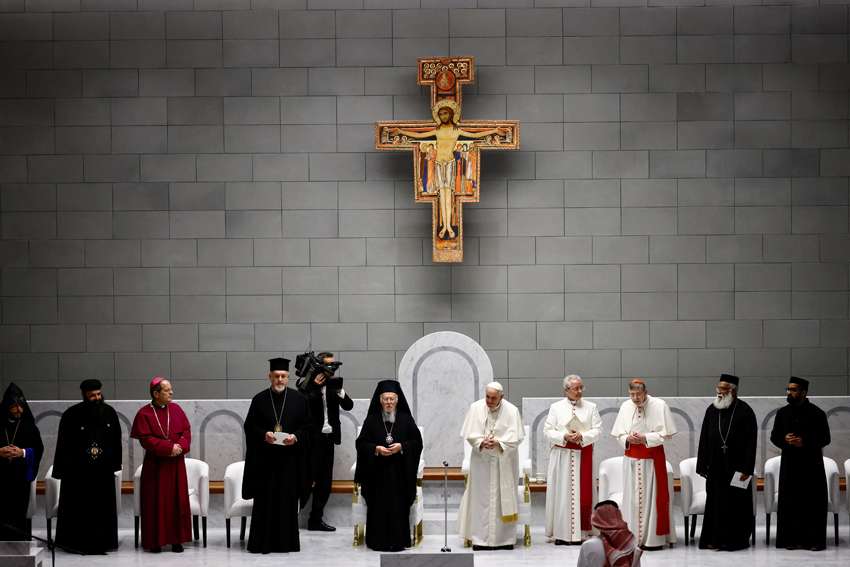Like sheep sent out among wolves, their presence sparked many things, including hostility and violence. When quiet voices are returned by shouting and aggression, we feel the power of the predicament that has always held captive the human race and each human heart. We need and desire peace, but something in us tangles us up and makes it impossible to attain. Peace is not inactivity, resignation or denial, but a creative act requiring every part of us to switch on and stir up its energy like flame.
Jesus is the Prince of Peace, not because He ignored reality, but because He took it on wholly and imbued it with every aspect of His being. How else could people like Zacchaeus, Jairus’ dead daughter, and the blind men be healed simply by Jesus’ look, His touch? He gave all, nothing held back or saved for later. (His long hours spent in prayer must have been needed).
It’s a foundational theological tenet of Christianity: God communicates all that He is, His very self, nothing held back. In His one Word, God speaks everything. God is never divided within Himself. This is the power of the three persons of the divine Trinity, so fully given and giving that the three are one, revealing that oneness is not “sameness” but infinite relatedness. And in Jesus, all that God is, and all that humanity is, come together and are completely given.
No wonder that at the moment of His Nativity, the angel tasked with giving the message to the shepherds finds that everybody in Heaven has come along too. They can’t hold back but burst into song: “Suddenly a great company of the heavenly host appeared with the angel, praising God and saying, ‘Glory to God in the highest Heaven, and on Earth peace to those on whom His favour rests!’ ” (Luke 2:13-14).
Peace is like that, a glory that spills over into everything, that doesn’t want to stop but gives with a joy that cannot contain itself.
Where Jesus touches, healing radiates, life blooms, death itself is reworked — and peace is born. For us who belong to Him, His human family whom He cares for unconditionally, peace “is very difficult, extremely difficult — but not impossible” (St. Paul VI).
In celebrating Epiphany (“showing-forth,” or ‘“evelation”), the Church invites us to let ourselves be lit up and transformed by the radical peace of God’s presence on Earth. The Wise Ones (or Three Kings) come from the mysterious Eastern lands, travelling through hardship into danger, but their wisdom is that they see, follow and receive the manifestation of God in the Christ-child. Not surprisingly, the very few sentences we have about them (transmitted only in Matthew) have profoundly moved people through the ages. Their coming into the Holy Family’s poverty and vulnerability reveals, not the enmity and violence humans always bring with them, but the glorious peace this Family shows forth. It’s the peace that’s born when humans, in their limitless variety, meet each other beyond their mutual fear and suspicion and together worship the one God, giving over every kind of wealth and knowledge to His care and so receiving it back purified, transformed and powerful. Of course the Wise Ones returned home by a different way (Matthew 2:12): they were different now.
“Easy for them,” we might think. Jesus and Mary were there among them, things were bright and fresh, God’s power inescapable. What about us, in the chaos and confusion of our centuries-later world, where all seem weary and spent, and hope for change imaginary at best? How can we possibly overcome the rage and despair we carry, which can randomly, at lightning-speed, get stirred to hostility and division?
The sign-bearer’s instinct to “stand and pray” surely shows the way. How was she able to take this way, except by being already a person of prayer? And by receiving the Christian gift of prayer, both personally and in the sacraments, till she herself shone like a sacrament of peace.
Peace and unity are gifts we receive and in receiving also give, costing not less than everything, giving glory that fills the Heavens and transforms the Earth. Yet it’s hard to witness the peace of Christ, so needed in a hostile world, when we ourselves stand in a divided Christianity. It is for this reason that seeking to become more closely united is a Christian duty. Divided Christianity is wounded peace, and medication withheld from the suffering human race.
(Marrocco can be reached at mary.marrocco@outlook.com.)


